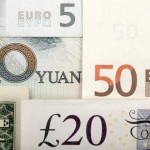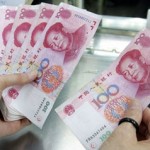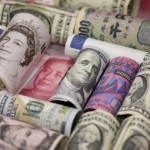Euro rose against the Dollar, Chinese Yuan continued to weaken; Big week for currency markets

Major currencies largely stuck to familiar ranges on Monday as investors shied away from taking big positions ahead of a flurry of crucial economic data and central bank monetary policy meetings this week.
The Bank of Japan ends a two-day meeting on Tuesday, the Federal Reserve concludes its meeting on Wednesday and the Bank of England is expected to raise interest rates on Thursday, a busy week which could set the near-term course for currencies.
The euro bucked the quiet mood, reversing some of the losses that followed the European Central Bank’s reaffirmation last week that rates would stay low through the summer of 2019.
Those gains came despite slightly softer German inflation numbers and euro zone sentiment data, and analysts said the euro’s rebound was largely because traders felt it had been oversold last week.
Investors appeared reluctant to make large bets for now.
“It will be an active week, there is a lot of event risk,” Credit Agricole analyst Manuel Oliveri said, referring to the central bank meetings as well as U.S. jobs data due on Friday.
“Markets are pretty much range-bound and it doesn’t look like there is much motivation to enter big positions.”
Oliveri said dollar net long positions remained at their largest for several months, and the greenback’s recent strength was vulnerable to a reversal of those positions.
The euro rose 0.3 percent to $1.1681 against the dollar.
The dollar index fell 0.2 percent to 94.495.
Upbeat second quarter U.S. gross domestic product data last week failed to lift the greenback, as markets had mostly priced in strong figures. Data that incorporates July, when tariffs against Chinese goods were activated, should prove more important.
The Swedish crown stood out as the biggest mover of the day, rallying more than 0.8 percent against the dollar and the euro after forecast-beating second-quarter GDP numbers.
The dollar was 0.1 percent higher at 111.10 yen, with markets preparing to see whether the BOJ is considering taking steps to make its massive stimulus programme more sustainable.
The dollar has eased from a six-month high above 113.00 yen hit on July 19, following speculation that the BOJ is preparing to tweak its policy.
Rabobank strategist Jane Foley said she was not expecting the BOJ to row back from its plans to continue with its stimulus because in the past the central bank had signalled its intentions to tweak policy before doing so.
“They haven’t told the market they are looking at something. Central banks rarely want to surprise the market,” she said.
The Chinese yuan continued to weaken. In offshore markets it fell to as low as 6.85 yuan per dollar, close to the one-year low it reached last week.
The yuan has been under relentless presure in recent months because of nervousness about what a dispute over trade with the United States will mean for China’s economy.
Source: Reuters – Big week for currency markets as central banks meet





























